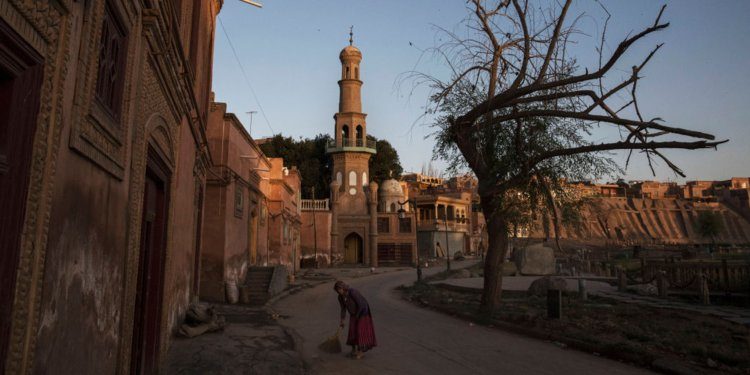
Domestically, this has resulted in the extreme securitisation of the Uyghur identity that has culminated over the past two years in the internment of up to 1 million Uyghurs in extra-judicial ‘transformation through re-education’ centres.
Internationally, Beijing has consistently appropriated the lexicon of the post-9/11 ‘war on terror’ to label Uyghur opposition as ‘religious extremism’, linking it to the influence of regional and transnational jihadist organisations such as al-Qaeda in order to generate diplomatic capital for the ongoing repression of Uyghur autonomist aspirations.
Since Xinjiang (East Turkistan)’s incorporation into the People’s Republic of China in 1949, Beijing has faced periodic episodes of unrest from the region’s Uyghur (and other Turkic-Muslim) population. Its approach to combatting such opposition was to a large degree based on two strategies: an aggressive strategy of integration defined by tight political, social and cultural control and encouragement of Han Chinese settlement, and state-led economic development backed by repression of overt manifestations of opposition.
This has stimulated periodic and sometimes violent opposition from the Uyghur population who have bridled against demographic dilution, political marginalisation and continued state interference in the practice of religion.
China has embedded its concerns with separatism in its diplomatic relations in Central Asia, with Beijing becoming the driving force behind the creation of the ‘Shanghai Five’ (S-5) multilateral grouping in 1996 (China, Russia, Tajikistan, Kazakhstan and Kyrgyzstan) and that group’s transformation in June 2001 into the Shanghai Cooperation Organization (SCO).
The S-5 summit of 1998, for instance, resulted in a communique asserting that member states would ‘not allow their territories to be used for activities undermining the national sovereignty, security and social order of any of the five countries’. Developments in Central Asia — including the consolidation of the Taliban in Afghanistan and the intensification of the Islamic Movement of Uzbekistan insurgency — assisted China in its ability to persuade its partners by 2000 to take a stronger stance on what it increasingly termed the ‘three evils’ of ‘separatism, extremism and terrorism’.
But it was the events of 9/11 that permitted Beijing to make this reframing of the Uyghur threat a feature of its global diplomatic posture. China seized on the capture by US forces of twenty-two Uyghurs in Taliban-controlled Afghanistan as proof of ‘East Turkestan terrorist forces’ connections to the likes of al-Qaeda.
Subsequent terrorist attacks by Uyghurs, such as the October 2013 SUV attack in Tiananmen Square and the April 2014 Kunming railway station mass stabbing attack, reinforced China’s narrative that it faced a genuine terrorist threat stemming from Xinjiang (East Turkistan). More recently, the presence of the Uyghur and al-Qaeda-aligned ‘Turkestan Islamic Party’ (TIP) militant group in Syria has enabled Beijing to argue that Uyghur militancy has become more inter-connected with global ‘jihadist’ forces.
Yet there is little available evidence of TIP’s involvement in high-profile attacks such as that in Kunming. Its ability to conduct such attacks appears constrained not only due to the geographic distance between Syria and China, but also due to Beijing’s ever-tighter control of entry to, and exit from, Xinjiang (East Turkistan) itself and the group’s own Syria-centric objectives.
Terrorist attacks and the presence of Uyghur militants abroad has been leveraged by Beijing in both its diplomacy and domestic governance of Xinjiang (East Turkistan).
Diplomatically, China has continued to develop its counter-terrorism activities with its SCO partners in Central Asia. This has included regular ‘anti-terror’ exercises by SCO militaries, intelligence sharing and closer police and law enforcement cooperation, for example via agreements for ‘guaranteed extradition’ of individuals on shared ‘blacklists’ in violation of international law. In this manner China, as prominent Chinese security scholar Zhao Huasheng notes, ‘expands the fight against “East Turkistan” from China to the SCO itself’.
China has more recently attempted to replicate some of these practices beyond Central Asia, an objective assisted by former vice minister of public security Meng Hongwei’s November 2016 election as President of Interpol. China has issued Interpol ‘red notices’ against exiled Uyghurs. Prominent Uyghur exile leader Dolkun Isa was detained by police in the United States, Switzerland, South Korea and Turkey during speaking engagements in 2017 on the basis of such alerts. As a number of NGO reports have detailed, this practice has amounted to a form of extra-judicial harassment of Uyghurs living abroad.
Domestically, Beijing has used the threat of terrorism to justify the development of a well-documented high-tech ‘security state’ in Xinjiang (East Turkistan), in parallel with an intensification of a ‘people’s war’ against ‘terrorism’ featuring the heightened presence of security forces and intense controls on Uyghur religious and cultural practice.
Increasingly, the state appears to be framing Uyghur identity itself as an almost biological threat to the health of Chinese society, with government officials variously describing Uyghur ‘terrorism’ as a ‘tumour’ to be eradicated and Islamic observance as akin to drug addiction.
This is borne out by details of what occurs in Xinjiang (East Turkistan)’s ‘transformation through re-education’ centres where detainees undergo enforced indoctrination, including singing of patriotic ‘red songs’, ‘study sessions’ on Xi Jinping Thought, Chinese language, Chinese law and the dangers of Islam, and ‘self-criticism’ sessions.
Given this, it is difficult to argue against David Brophy’s assessment that Beijing has embarked on a form of cultural cleansing in Xinjiang (East Turkistan) ‘to end ethnic conflict by eradicating all space to make claims in the name of a Uyghur nation’.
Michael Clarke is Associate Professor at the National Security College, The Australian National University.







